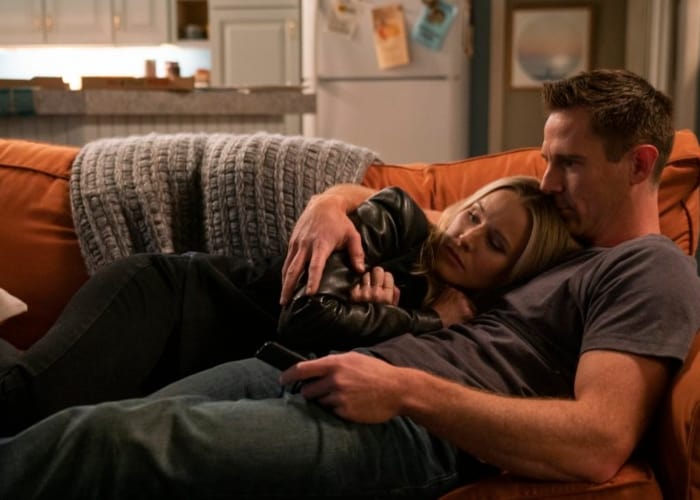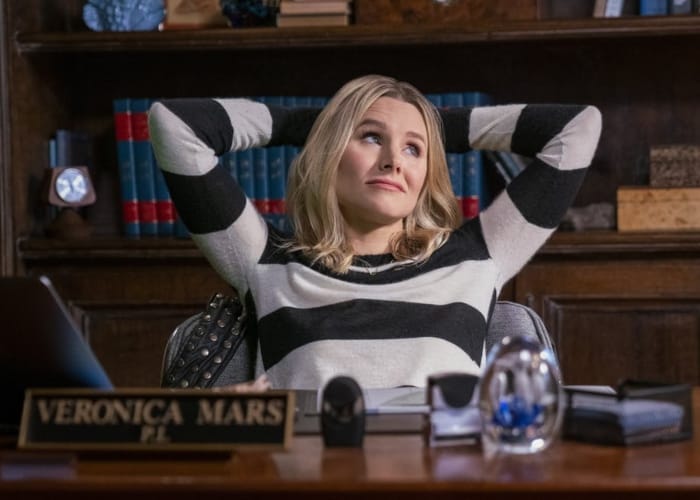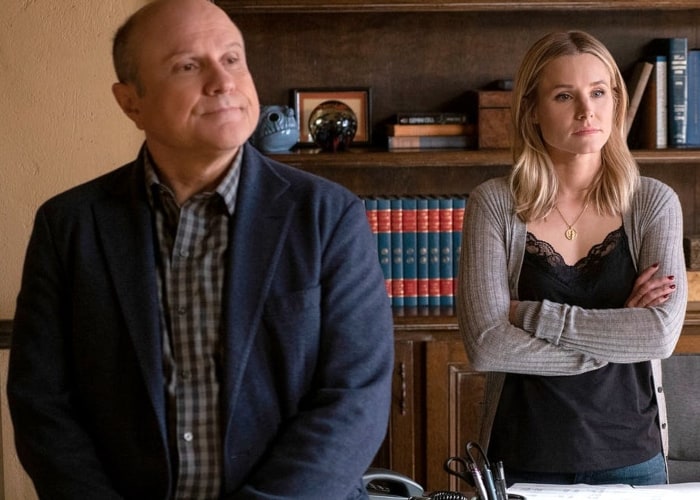
To borrow a phrase she might use during one of her own noir bits, Veronica Mars is a tough nut to crack.
The hard-boiled former teen sleuth who’s been played by Kristen Bell for well over a decade ended the 2014 film by comparing herself to an Alcoholics Anonymous attendee. “I’ve rolled around in the mud for so long, wash me clean and I don’t recognize myself,” she says in her signature voiceover. “So how about I just accept the mud and the tendency I have to find myself rolling in it? My name is Veronica, and I’m an addict.” And to be fair, she is addicted: to danger, and mystery, and the always mysterious and dangerous Logan Echolls (Jason Dohring), and above all else, the neon-lit cesspool that is Neptune.
The fictional coastal California city at Veronica Mars’ black heart–the site of the titular character’s rape and her best friend’s murder, among other things–has changed in the long-anticipated fourth season of Rob Thomas’ sardonic neo-noir, which is now on Hulu. The city we see, now plagued by seemingly random bombs at the height of spring break, has been crumbling under economic and political pressure. Rent control and small businesses are on their way out, replaced by lavender lattes, smart homes, and so-called concierge medicine. Richard “Big Dick” Casablancas (David Starzyk) is a disgraced but wealthy real estate tycoon who is taking over the town one storefront at a time, while Veronica laments that no one chose to give him power (sound familiar?).

In a philosophical space that dovetails nicely with the AA metaphor, season four is all about control. Across eight densely plotted episodes, the idea of control–choices and consequences, or the lack of either– resurface again and again. Control is an illusion, cartel hitman Alonzo (Clifton Collins Jr.) tells his partner early in the premiere, and for a while, it seems like he’s right. “Once a girl sets and hardens, her life becomes a series of apologies,” Veronica says, examining her jaded core even as she shows a capacity for hope–in this case for a new teen would-be investigator whose trauma hasn’t isolated her yet.
When Logan and Veronica discuss marriage, she cites the failed relationships they’ve witnessed as reasons to avoid the institution, as if failure is inevitable. When PCH biker Weevil (Francis Capra) returns to his criminal roots, he plaintively tells Veronica that he has no choice but to work outside a system that refuses to see him as anything else but a bad guy. And when Veronica’s dad Keith (Enrico Colantoni, always a warm and welcome on-screen presence in this role) starts losing his memory, it seems like his deterioration is an unavoidable, random cruelty. While one character states offhand that the world “stopped making sense when Prince died,” Veronica sums it up with a flippant half-joke: “Who even cares anymore? Isn’t that what we’re all learning? Nothing matters.” It’s all, in a word, pretty damn bleak.
That’s the blessing and the curse of the latest season of Veronica Mars. It’s the first season of the show to truly go full noir, and the result is clever, cynical, and more serious than ever before. New characters abound (J.K. Simmons’ Clyde and Kirby Howell-Baptiste’s Nicole are standouts), enough to plant a half-dozen red herrings and fuel some major character growth while they’re at it. Old characters return, but they’re never quite as successful or happy or easily definable as one would expect in a series revival. Veronica Mars has always had a knack for exploring the specific breed of corruption that’s borne of perceived entitlement–namely wealthy peoples’ entitlement to the time and dignity of others, and men’s’ entitlement to the bodies of women. Few shows have ever explored rape culture better than this one. That’s all there this season, but the corruption is mutating to fit the times, too; political pundits, xenophobic randos, apathetic authorities, and true crime fanatics fill out the overstuffed cast of characters, and in true noir fashion, everyone has a secret.

On a technical level, this season of Veronica Mars is stellar. The acting, writing, and music will feel like coming home for Marshmallows who survived the great Kickstarter endeavor of 2013 and still craved more after the movie and tie-in novels. Somewhere along the way, the dramatic saturation and editing that are synonymous with the show’s classic first season disappeared completely, and maybe those are the final signifiers of maturity that make this season feel like a different show. But something else is missing as well: the season is lacking in destined-to-be-classic episodes. There’s no hour that fuels you up with adrenaline and then cracks your heart open like previous season highlights “Leave It To Beaver,” “Not Pictured,” and “Spit & Eggs.” That raw, sustained intensity is replaced by several scenes of interspersed action, but the ending feels rushed, and it’s clear that the season could’ve worked just as well with more episodes. Luckily, there’s room to grow, as the showrunner and star plan to keep the beloved character alive as long as possible.
In the end, everything comes back to the question two loquacious killers contemplated at its start: does anyone even have a choice? The season’s divisive, shocking last-minute twist seems to favor the cynical answer, but a closer look at the season implies that Veronica Mars isn’t destined to give itself completely over to nihilism quite yet. AA’s well-known Serenity Prayer talks about what you can and can’t change, and in Neptune, our judge of a person’s character seems to hinge on their reaction to the can’t-changes. Dark shit happens, especially in this town, and this season we’re lucky enough to see characters both new and old react to the darkness in courageous ways. You either commit to love or you don’t. You ask for help or you give up. You hold a grudge or you let it go. You break down or you get tougher. And if you know and love Veronica, you’ll know this: she can always get tougher.
Related Topics: Kristen Bell, rob thomas, veronica mars

